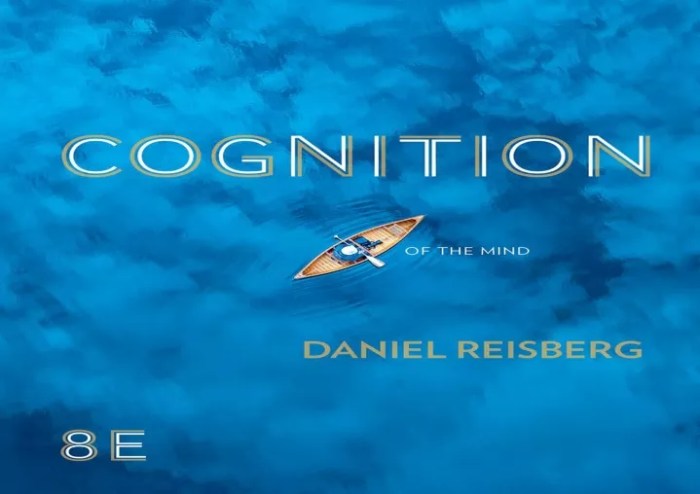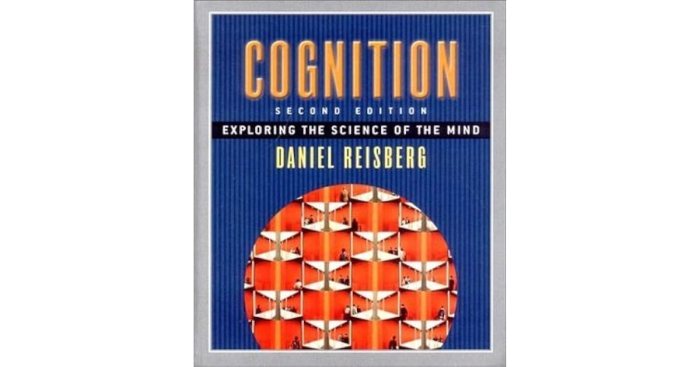Cognition daniel reisberg 8th edition – Daniel Reisberg’s 8th edition of Cognitive Psychology presents a captivating exploration of the intricate workings of the human mind, inviting readers to delve into the fundamental processes that shape our thoughts, perceptions, and actions. This comprehensive guide unravels the complexities of cognition, providing a rich tapestry of insights and practical applications.
Reisberg’s masterful synthesis of cutting-edge research and engaging examples illuminates the dynamic interplay between cognitive processes, attention, memory, language, problem-solving, emotion, and cultural influences. The 8th edition empowers readers with a deeper understanding of how we perceive, interpret, and navigate the world around us.
Cognitive Processes: Cognition Daniel Reisberg 8th Edition

Cognition encompasses various mental processes that enable us to perceive, learn, remember, and think. According to Daniel Reisberg’s 8th edition, these processes include perception, attention, memory, language, thought, problem-solving, and decision-making.
These processes interact in real-world scenarios. For instance, perception involves receiving sensory information, while attention allows us to focus on specific stimuli. Memory stores information for later retrieval, and language enables us to communicate and share thoughts.
Attention and Memory, Cognition daniel reisberg 8th edition
Attention is crucial for cognition, allowing us to select and focus on relevant information while ignoring distractions. Selective attention involves directing focus to specific stimuli, while divided attention involves allocating attention to multiple tasks simultaneously.
Memory is essential for cognition, enabling us to encode, store, and retrieve information. There are different types of memory, including short-term memory (STM), which holds information for a short period, and long-term memory (LTM), which stores information for extended periods.
Language and Thought
Language and thought are closely intertwined. Language provides a medium for expressing thoughts, while thoughts influence our language and shape our understanding of the world.
For instance, the language we speak can influence how we perceive and categorize objects and events. Similarly, our thoughts can shape the way we use language, such as the metaphors and analogies we employ.
Problem-Solving and Decision-Making
Problem-solving involves finding solutions to problems, while decision-making involves selecting the best course of action among multiple options.
Problem-solving typically involves defining the problem, generating solutions, evaluating alternatives, and implementing the chosen solution. Decision-making often involves weighing the pros and cons of different options and considering the potential risks and rewards.
Emotion and Cognition
Emotions and cognition are interconnected. Emotions can influence our thoughts, decision-making, and memory. For instance, fear can narrow our attention and impair our ability to make rational decisions.
Conversely, cognitive processes can also regulate emotions. For example, cognitive reappraisal involves changing our interpretation of emotional events to reduce their impact.
Cultural Influences on Cognition
Culture plays a significant role in shaping cognitive processes. Language, values, and beliefs can influence our perception, thinking, and decision-making.
For instance, research has shown that people from collectivist cultures tend to focus more on the group than on the individual, while people from individualistic cultures tend to prioritize personal goals and independence.
Applications of Cognitive Psychology
Cognitive psychology has numerous practical applications in various fields:
- Education:Understanding cognitive processes can help educators design effective teaching methods and curricula.
- Healthcare:Cognitive psychology can aid in the diagnosis and treatment of cognitive disorders such as Alzheimer’s disease and dementia.
- Marketing:Cognitive principles are used to understand consumer behavior and develop effective marketing campaigns.
Current Trends in Cognitive Research
Cognitive research is continuously evolving, with new advancements and emerging trends:
- Neuroimaging:Techniques such as fMRI and EEG are used to study the neural basis of cognition.
- Artificial Intelligence (AI):AI is used to create computer models that simulate cognitive processes, leading to insights into human cognition.
- Cross-Cultural Cognitive Research:Researchers are increasingly exploring the cultural influences on cognition, expanding our understanding of the diversity of cognitive processes.
FAQ Corner
What are the key cognitive processes described in Reisberg’s 8th edition?
Reisberg identifies various cognitive processes, including perception, attention, memory, language, problem-solving, and decision-making, which interact to shape our understanding and behavior.
How does attention play a crucial role in cognition?
Attention allows us to focus on specific stimuli while filtering out distractions. Selective attention enables us to concentrate on relevant information, while divided attention involves managing multiple tasks simultaneously.
What is the relationship between language and thought?
Language provides a framework for organizing and expressing our thoughts. It influences our perceptions and shapes our understanding of the world. Conversely, thoughts influence the way we use language, affecting our choice of words and sentence structure.
How can cognitive biases impact problem-solving and decision-making?
Cognitive biases are systematic errors in thinking that can lead to irrational decisions. They arise from cognitive shortcuts and can hinder our ability to objectively evaluate information and make optimal choices.
What are some practical applications of cognitive psychology?
Cognitive psychology has applications in various fields, including education, healthcare, and marketing. By understanding cognitive processes, we can develop effective teaching methods, improve healthcare interventions, and design persuasive marketing campaigns.

